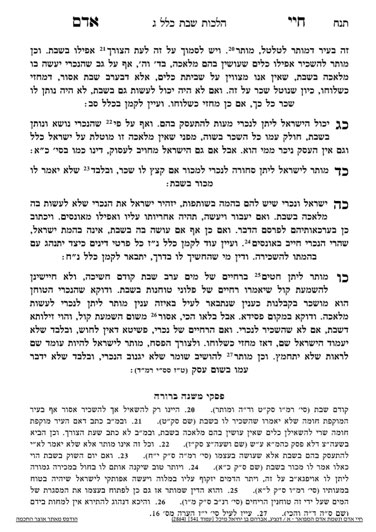Be’ezras Hashem, our 100th Shabbos shiur is coming up soon, and is available for sponsorship! Please contact shiurim@dvarhalacha.com for more information.
We are continuing in siman 26. The Chayei Adam is discussing a millstone, and wrote that even though there is no concern for maris ayin, there is a concern for zilusa d’Shabbos as a result of the noise made by the millstone, known as hashma’as kol.
In truth, there is a machlokes whether the issue with the millstone is purely the maris ayin, or whether there is an additional concern of zilusa d’Shabbos. It is for this reason that the Chayei Adam paskened with a compromise, that we are concerned for zilusa d’Shabbos unless there is a financial loss.
A contemporary example discussed by the poskim is a gardener. Most gardeners are hired on a contract (so they are a kablan and not a sechir yom), and are free to do the work whenever they wish. Thus, there is no issue of maris ayin, because it is clear that the Jewish owner did not instruct them to come specifically on Shabbos. On the other hand, the noise they generate is clearly zilusa d’Shabbos, so it cannot take place on Shabbos. Another example would be a contractor building a building on Shabbos.
When the concern is only for zilusa d’Shabbos, if the work takes place outside the techum, it is not a problem.
On the other hand, the poskim assume that we can extend this issue from non-Jews to Jews. In other words, if a noisy machine is set in motion before Shabbos, even if there is no non-Jew involved, there will be an issue of zilusa d’Shabbos. Rav Chaim Pinchas Scheinberg ztl applies this point to a noisy dryer which is left on before Shabbos going into Shabbos. Thus, we see applications of zilusa d’Shabbos outside of amira l’achum situations.
The Chayei Adam continues, and writes that if the Jew rents the mill to a non-Jew (in a halachically permissible way, as we discussed in S0094-95), there is no issue of zilusa d’Shabbos, because it is all the business of the non-Jew. It is part of our reality that non-Jew operate their businesses on Shabbos, but it is their choice.
If the actual mill belongs to the non-Jew, and the non-Jew hires himself out to mill flour for customers, the non-Jew is working for himself. He is considered a kablan, since he is paid per job. He can mill the Jew’s grain on Shabbos, because it is his own choice and on his own time that he decided to mill it on Shabbos. The Chayei Adam adds that the Jew should not be present overseeing the process, because then it appears as though the Jew is giving the non-Jew instruction on Shabbos and making the non-Jew into his agent.
Regarding Pesach, it is muttar to a Jew to oversee the grain to ensure no water gets in. Similarly it is muttar to place a Jewish guard to ensure the non-Jew does not steal any grain for himself. However, the Jew cannot engage the non-Jew in conversation, because it again would appear as though the Jew is giving directives to the non-Jew.
Summary
It is muttar to set melacha in motion before Shabbos which will operate over Shabbos with two conditions.
- One must be concerned for maris ayin, but there is no issue of maris ayin if it is something which is standard to derive benefit from on Shabbos due to having set it in motion before Shabbos.
- One must also be concerned about zilusa d’Shabbos, but can be meikil in a case of financial loss. Additionally, if there is no maris ayin, one can be meikil on zilusa d’Shabbos outside of the techum.
A non-Jewish kablan, who does his work at a time of his choice, may perform work for a Jew on his machinery on Shabbos. The Jew should not be present, but if he must be present, he cannot say anything to the non-Jew while he is present.



